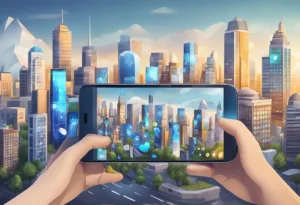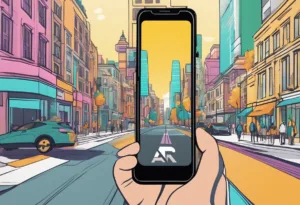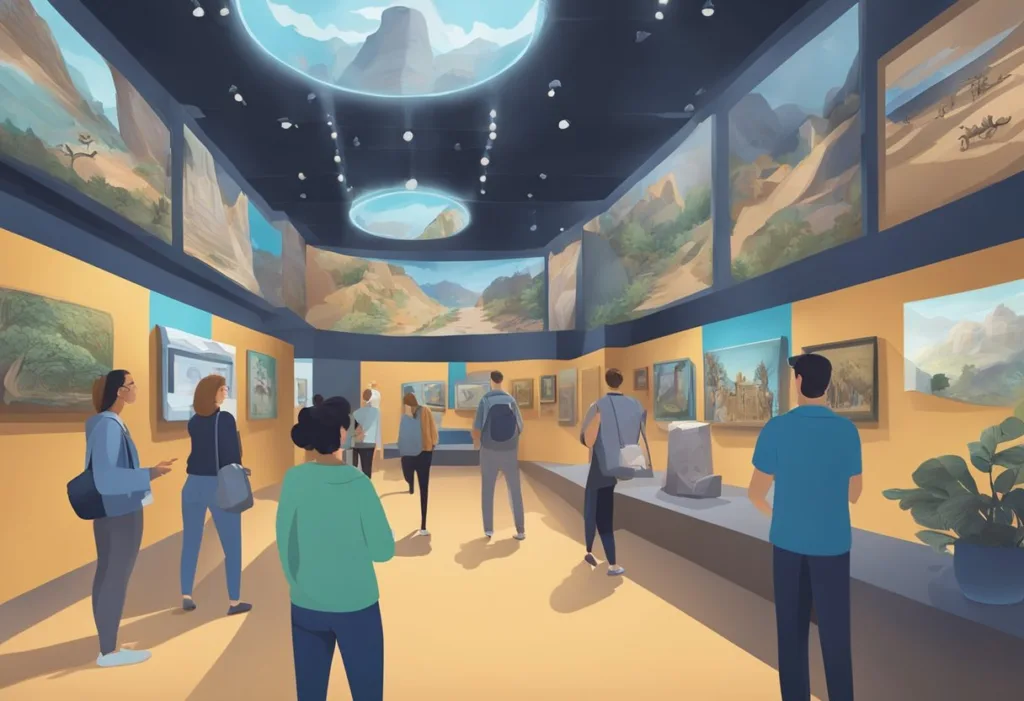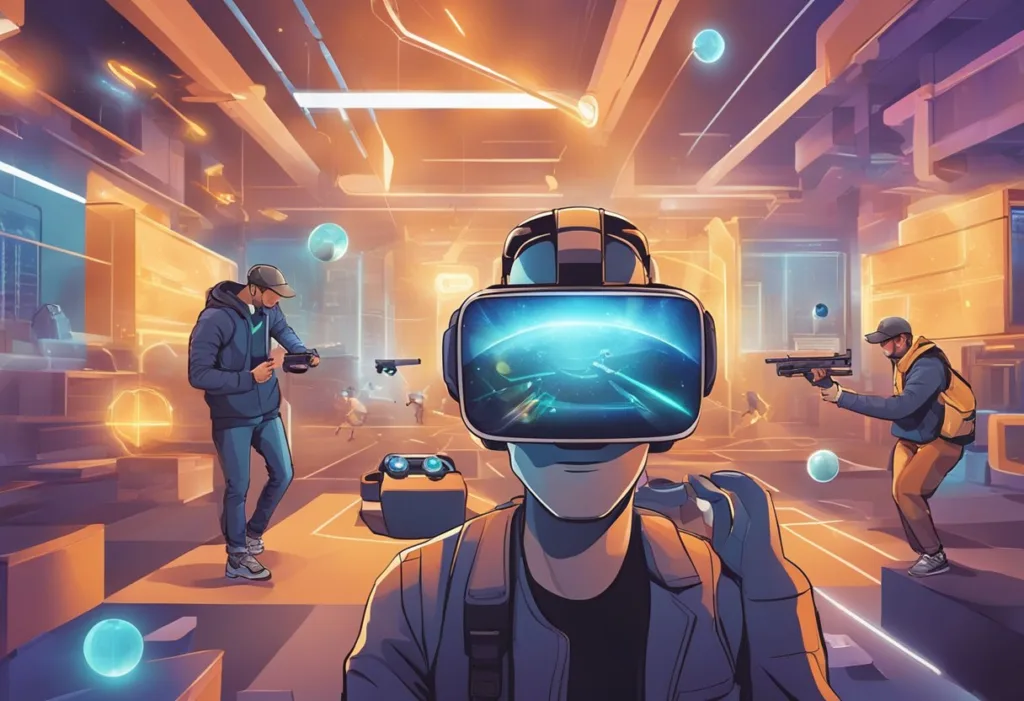Metaverse is a virtual world that has gained immense popularity in recent years. It is a virtual space where users can interact with each other and the environment in real-time. It is a world that is powered by technologies like virtual reality, augmented reality, and artificial intelligence. Developers who are interested in creating this virtual world need to possess extensive knowledge about different types of related software, experience writing and debugging code, designing virtual environments, and much more.
To become a Metaverse developer, one needs to have the skills of creating a digital and immersive world that the users can communicate with. Developers need to build such applications and games that could interact with the users with the help of VI, AR, and AI technology. The Metaverse market was worth $63.3 billion in 2021, and by 2024, experts anticipate it to reach $800 billion. This significant growth potential signals new opportunities for developers who want to become a part of this industry.
The Metaverse is a virtual universe that’s a network of worlds that uses virtual and augmented reality, and users can socialize, buy and sell items, and play games. Developing a Metaverse application in today’s environment means developing a game or “experience” for any number of different platforms, from VR systems like the Oculus Quest and HTC Vive to emerging virtual worlds like Roblox and Fortnite, to gaming consoles like Playstation and Xbox, to mobile apps, and even the web. The demand for Metaverse developers is increasing rapidly, and it is a lucrative career option for those who have the required skills and knowledge.
Fundamentals of Metaverse Development
Metaverse development involves creating digital and immersive worlds that users can interact with. It is a complex and rapidly evolving field that requires a diverse set of skills and knowledge. In this section, we will explore the fundamentals of metaverse development, including understanding the metaverse and key technologies and platforms.
Understanding the Metaverse
The metaverse is a virtual world that is created by the convergence of virtual reality (VR), augmented reality (AR), mixed reality (MR), and other immersive technologies. It is a fully realized digital world that is accessible to anyone with an internet connection. The metaverse is not a single platform or technology, but rather a collection of technologies and platforms that work together to create a seamless and immersive experience.
Metaverse development requires a deep understanding of the underlying technologies and platforms that make up the metaverse.
This includes knowledge of VR and AR technology, as well as experience with 3D modeling and design. Developers must also have a strong understanding of artificial intelligence (AI) and how it can be used to create more realistic and immersive experiences.
Key Technologies and Platforms
There are several key technologies and platforms that are essential to metaverse development. These include Unity, Roblox, and Web3. Unity is a popular game engine that is used to create 3D games and applications. It is widely used in the gaming industry and is an essential tool for metaverse development.
Roblox is another popular platform for metaverse development. It is a user-generated game platform that allows users to create and share their own games and experiences. Roblox is a great platform for beginners to learn about metaverse development, as it is easy to use and has a large community of developers.
Web3 is a new technology that is being used to create decentralized applications (dApps) that run on blockchain networks. It is an essential tool for metaverse development, as it allows developers to create secure and decentralized virtual worlds. Web3 also enables the creation of non-fungible tokens (NFTs), which are digital assets that can be used to represent ownership of virtual items.
Metaverse development is a complex and rapidly evolving field that requires a diverse set of skills and knowledge. Developers must have a deep understanding of the underlying technologies and platforms that make up the metaverse, as well as experience with 3D modeling and design. Key technologies and platforms for metaverse development include Unity, Roblox, and Web3.
Core Metaverse Development Skills
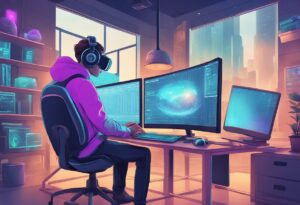
Metaverse developers require a range of core development skills to succeed in this field. These skills include programming languages, software development skills, and UI/UX design.
Programming Languages
Developers must be proficient in programming languages such as Java, Python, and JavaScript, which are widely used in metaverse development. They must also have experience with Solidity, Swift, and C++, which are essential for developing smart contracts and blockchain-based applications.
Software Development Skills
Metaverse developers must be proficient in software development skills such as writing and debugging code, working with software development tools such as SDKs and APIs, and designing virtual environments. They must also have experience with software development methodologies such as agile and DevOps.
UI/UX Design
Developers must have a strong understanding of UI/UX design principles and be able to create immersive and engaging virtual environments. They must be able to design interfaces that are intuitive and easy to use, as well as create 3D models and animations that bring the virtual world to life.
In conclusion, metaverse developers require a range of core development skills to succeed in this field. They must be proficient in programming languages such as Java, Python, and JavaScript, have experience with software development tools such as SDKs and APIs, and be able to create immersive and engaging virtual environments using UI/UX design principles.
Advanced Metaverse Technical Knowledge
Metaverse development requires a high level of technical expertise. Developers must have a deep understanding of the technologies used to create immersive experiences, work with blockchain and smart contracts, and implement artificial intelligence in the metaverse.
Immersive Experience Creation
Creating immersive experiences in the metaverse requires a combination of design, game development, 3D modeling, animation, and graphics skills.
Developers must be proficient in using tools such as Unity and Unreal Engine to create realistic virtual environments. They must also be able to optimize performance and reduce latency to ensure a smooth user experience.
Blockchain and Smart Contracts
Blockchain technology is at the heart of the metaverse, providing the foundation for secure transactions and ownership of digital assets.
Metaverse developers must be familiar with blockchain platforms such as Ethereum and be able to write smart contracts using programming languages such as Solidity. They must also have a deep understanding of decentralized finance (DeFi) and how it can be applied in the metaverse.
Artificial Intelligence in Metaverse
Artificial intelligence (AI) is becoming increasingly important in the metaverse, enabling intelligent agents to interact with users and provide personalized experiences. Developers must be proficient in using AI frameworks such as Caffe, PyTorch, and TensorFlow to create intelligent agents that can learn from user interactions.
They must also be able to integrate AI with other technologies such as blockchain and smart contracts to create powerful metaverse applications.
Advanced technical knowledge is essential for metaverse developers. They must have a deep understanding of immersive experience creation, blockchain and smart contracts, and artificial intelligence. By mastering these skills, developers can create powerful metaverse applications that provide engaging and personalized experiences for users.
How to Become a Metaverse Developer

Becoming a metaverse developer requires a unique set of skills and knowledge. Here are the steps to take to become a successful metaverse developer:
- Develop Programming Skills: Metaverse developers need to have a strong programming background. They should have experience with programming languages such as C++, Python, and JavaScript. They should be familiar with blockchain technology and smart contracts.
- Gain Experience with 3D Modeling: Metaverse developers should be able to design and build virtual environments. They should be proficient in 3D modeling software such as Blender, Maya, and SketchUp.
- Familiarize Yourself with Development Tools and Platforms: Metaverse developers should have experience with various development tools and platforms. They should be familiar with game engines such as Unity and Unreal Engine. They should be comfortable working with APIs and SDKs.
- Stay Up-to-Date with the Latest Trends and Technologies: Metaverse developers should stay up-to-date with the latest trends and technologies in the industry. They should attend conferences, read industry publications, and network with other developers.
- Build a Portfolio: Metaverse developers should build a portfolio of their work. They should showcase their skills and experience by creating virtual environments and applications.
By following these steps, aspiring metaverse developers can gain the necessary skills and experience to succeed in this exciting and rapidly growing field.
The Metaverse Ecosystem
The Metaverse is a complex and evolving ecosystem of technologies, platforms, and standards that enable users to interact with each other and with digital objects in a virtual space. As such, it requires a range of skills and knowledge from developers who want to create applications and experiences in this space.
Interoperability and Standards
One of the key challenges of the Metaverse is ensuring interoperability between different platforms and technologies.
To achieve this, developers need to be familiar with XR technologies and XR SDKs such as Wikitude and Vuforia. These technologies provide the building blocks for creating immersive experiences that can be deployed across multiple platforms, including Oculus Quest and HTC Vive.
In addition to XR technologies, developers also need to be aware of emerging standards for the Metaverse, such as the Decentralized Identity Foundation (DIF) and the Decentralized Finance (DeFi) movement. These standards aim to create a more open, decentralized, and secure Metaverse that is accessible to all users, regardless of their location or device.
Security and Privacy
Security and privacy are also critical issues in the Metaverse. Developers need to be familiar with cyber security best practices, such as using third-party libraries for encryption and authentication. They also need to be aware of the potential risks associated with decentralization and how to mitigate them.
To ensure the privacy of users, developers need to be familiar with the latest developments in internet privacy and data protection laws. They also need to be able to design applications that protect user data and prevent unauthorized access.
The Metaverse ecosystem is a complex and evolving space that requires a range of skills and knowledge from developers. By staying up-to-date with emerging technologies and standards, and by prioritizing security and privacy, developers can create immersive and engaging experiences that are accessible to all users.
Career and Industry Insights
Job Roles and Responsibilities
The Metaverse is a rapidly growing industry, and with it comes a host of new job opportunities. Developers and engineers are in high demand, as they are responsible for building the virtual worlds that make up the Metaverse.
Product managers are also needed to oversee the development of new products and features, while ecosystem developers ensure that the Metaverse is a thriving and interconnected environment.
Job responsibilities in the Metaverse can vary widely depending on the specific role. Developers and engineers are responsible for coding and building virtual worlds, while product managers oversee the development of new products and features.
Ecosystem developers ensure that the Metaverse is a thriving and interconnected environment. Soft skills such as communication, collaboration, and problem-solving are also highly valued in the industry.
Trends and Future Outlook
The Metaverse is still in its early stages, but it is already showing tremendous potential for growth. As the industry continues to evolve, new job opportunities will arise, and existing roles will become more specialized. Salaries in the Metaverse industry are competitive, and developers and engineers can expect to earn a high income.
The future of the Metaverse is bright, with many experts predicting that it will become the next big thing in the evolution of the internet. The Metaverse has the potential to revolutionize the way we interact with each other and with technology.
The gaming industry is already embracing the Metaverse, with many games incorporating interactive and immersive elements. The Metaverse also has the potential to transform marketing, allowing companies to create virtual experiences that engage customers in new and exciting ways.
As the Metaverse continues to evolve, it will be important for developers and engineers to stay up-to-date with new skills and technologies. Creativity and a strong creative vision will also be essential, as the Metaverse offers endless possibilities for innovation and exploration.
The Metaverse presents exciting opportunities for developers, engineers, and other professionals looking to build a career in a dynamic and fast-growing industry.
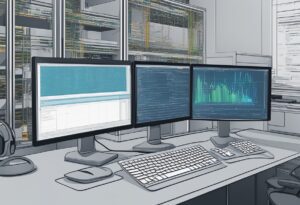
Frequently Asked Questions
What are the essential skills required for a Metaverse developer?
Metaverse developers must have a strong foundation in programming languages such as C++, Java, Python, and R. They should also be proficient in big data technologies like Apache Spark, Cassandra, Hadoop, and MongoDB. Familiarity with machine learning (ML) algorithms like KNN, linear regression, and support vector machines is also essential.
How can one start a career in Metaverse development?
To start a career in Metaverse development, one can begin by learning the necessary programming languages and technologies. There are various online courses and certifications available that can help one gain the required skills. It is also important to stay up-to-date with the latest trends and developments in the field.
What programming languages are most commonly used in Metaverse development?
The most commonly used programming languages in Metaverse development include C++, Java, Python, and R. These languages are widely used for developing immersive and interactive applications and games.
Are there any specific certifications or courses recommended for aspiring Metaverse developers?
There are various certifications and courses available for aspiring Metaverse developers. Some of the popular ones include Certified Unity Developer, Unreal Engine Certification, and Coursera’s Game Development Specialization. However, it is important to research and choose a certification or course that aligns with one’s career goals and interests.
What is the average salary range for a professional working in Metaverse development?
The average salary range for a professional working in Metaverse development varies depending on factors such as experience, location, and company size. According to Glassdoor, the average salary for a Metaverse developer in the United States is around $100,000 per year.
What tools and technologies should one be familiar with to excel in Metaverse development?
To excel in Metaverse development, one should be familiar with tools and technologies such as Unity, Unreal Engine, Blender, and Maya. Knowledge of virtual reality (VR) and augmented reality (AR) technologies is also important. Developers should have a good understanding of big data technologies and machine learning algorithms.







